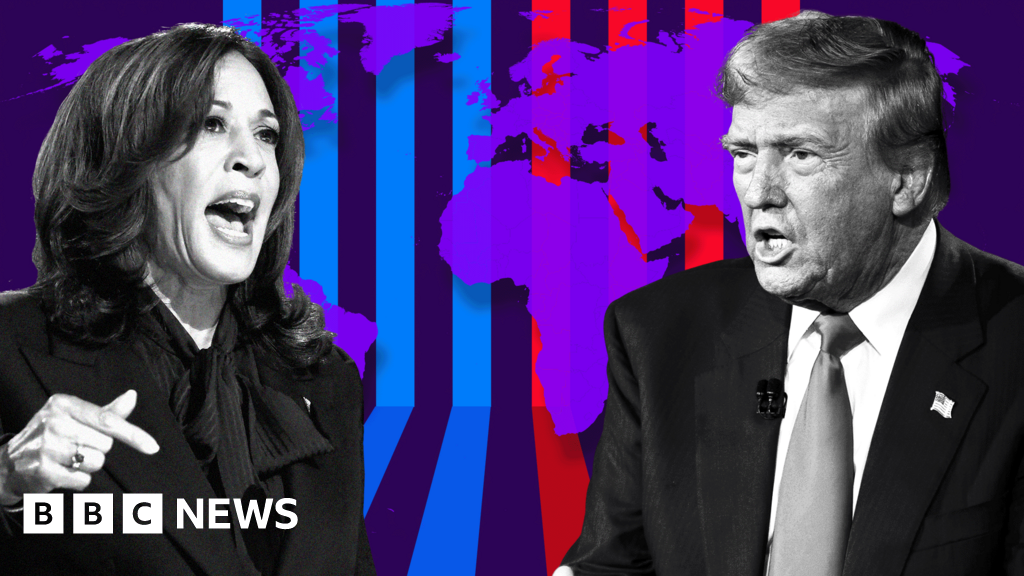The Global Impact of the Harris-Trump Debate: A Look from Around the World
The first presidential debate between Kamala Harris and Donald Trump was a highly anticipated event, not just in the United States but across the globe. The debate, held in Philadelphia, was marked by intense exchanges, particularly on foreign policy, drawing reactions from various international observers. From Moscow to Kyiv, and from Beijing to Budapest, the implications of the candidates’ statements were scrutinized, revealing the global stakes of the upcoming election.
Mentions of Putin Noted by the Kremlin
In Moscow, the Kremlin was quick to react to the debate, particularly to Kamala Harris’s assertion that President Vladimir Putin is “a dictator who would eat you for lunch.” This phrase, while colorful, was lost in translation, as the idiom does not exist in Russian. However, the Kremlin’s interest in the U.S. election outcome is palpable, as they hope for a result that favors their geopolitical ambitions.
Trump’s evasive response to whether he wanted Ukraine to win the war was particularly noted. His statement, “I want the war to stop,” contrasted sharply with Harris’s strong support for Ukraine’s “righteous defense” against Russian aggression. Kremlin spokesman Dmitry Peskov expressed irritation at the frequent mentions of Putin during the debate, suggesting that such references are used as tools in the internal U.S. political struggle.
Concern in Kyiv Over Trump Comments
In Ukraine, the debate’s implications were met with concern. Trump’s failure to affirm support for Ukraine’s victory in the ongoing war against Russia raised alarms among Ukrainians. Many fear that a second Trump term could lead to a detrimental peace deal that would require Ukraine to cede territory to Russia. In contrast, Harris’s unwavering support for Ukraine was reassuring to many, as she highlighted her role in sharing vital intelligence with President Volodymyr Zelensky before the invasion.
Ukrainian officials remained largely silent during the debate, focusing instead on the ongoing conflict at home. However, President Zelensky’s previous comments suggested that a Trump victory would necessitate “hard work” for Ukraine, hinting at the challenges that may lie ahead.
Abdul Memes Follow Trump Taliban Remarks
The chaotic U.S. withdrawal from Afghanistan in August 2021 also resurfaced during the debate. Harris sidestepped questions about her responsibility for the withdrawal, while Trump boasted about his tough negotiations with “Abdul,” referring to the Taliban. This misnomer sparked a wave of internet memes, as many questioned who “Abdul” was, given that the Taliban’s leadership structure had changed since the U.S. exit.
Both candidates addressed the flawed deal with the Taliban, but the debate highlighted the shared responsibility for the disastrous withdrawal. The American public remains divided on the issue, with many still grappling with the implications of the U.S. exit from Afghanistan.
Harris Represents Uncertainty for Beijing
In Beijing, the debate was closely monitored, as Kamala Harris remains an unknown quantity for Chinese leaders. Her assertion that the U.S. would win the competition for the 21st century contrasted with Trump’s aggressive stance on imposing tariffs on Chinese goods. This unpredictability is something that Chinese officials find troubling, as they seek stability in their economic relations with the U.S.
Harris’s accusations against Trump for allegedly aiding China’s military modernization by selling American chips added another layer of tension. While Chinese academics believe U.S. policy towards China will remain consistent regardless of the election outcome, the debate underscored the potential for renewed economic conflict.
White House Race Keenly Watched in the Middle East
The debate’s implications were also felt in the Middle East, particularly in Israel, where the ongoing conflict in Gaza has heightened tensions. Trump’s hyperbolic claim that Israel would not exist in two years if Harris were elected resonated with many observers. Critics of Israeli Prime Minister Benjamin Netanyahu suspect that he may be stalling for a ceasefire until after the U.S. election, hoping for a more favorable outcome with Trump.
Harris’s potential to take a tougher stance on Israel than President Biden has raised concerns among Israeli officials. Conversely, Palestinians, who view Trump with skepticism, may see Harris as a more favorable option due to her commitment to Palestinian statehood.
Praise for Orban Makes Waves in Hungary
In Hungary, Trump’s praise for Prime Minister Viktor Orban during the debate was met with enthusiasm from pro-government media, which heralded it as “huge recognition.” Orban’s support for Trump in the 2016 election and his continued backing in the current race highlight the political alignment between the two leaders. However, critics in Hungary expressed alarm at Trump’s endorsement of Orban, viewing it as a troubling signal for democratic values.
The Hungarian government is banking on a Trump victory to potentially reshape the geopolitical landscape in Europe, particularly regarding the ongoing war in Ukraine.
Conclusion
The Harris-Trump debate was not just a domestic political event; it reverberated across the globe, influencing perceptions and strategies in various countries. As the election approaches, the stakes are high, with foreign leaders and citizens alike keenly aware of how the outcome could reshape international relations. The debate underscored the interconnectedness of global politics and the far-reaching implications of U.S. presidential elections.


